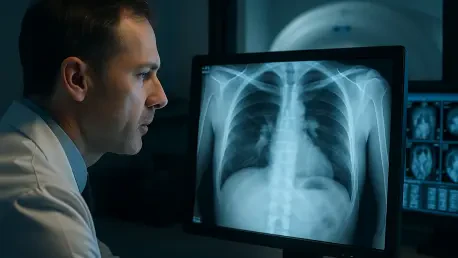In recent years, AI has sparked a revolution in radiology revenue cycle management (RCM), encapsulating a glimpse into a future where technology seamlessly integrates with healthcare administration. As AI’s capabilities soar beyond image interpretation, it now embarks on optimizing billing processes and propelling revenue collection. This evolution showcases the immense impact and potential improvements AI can bring to radiology practices struggling with shrinking reimbursements and increasing administrative burdens. This analysis delves into AI’s pivotal role in radiology RCM, exploring its current adoption, applications, expert perspectives, and the road ahead.
Understanding AI’s Role in Radiology RCM
Adoption and Impact Statistics
In the realm of radiology RCM, AI adoption has rapidly soared, with an increasing number of practices leveraging it to streamline operations. Recent statistics indicate a sharp rise in AI deployment, with radiology practices witnessing improved claims processing times and reduced billing errors. According to industry reports, AI adoption in radiology RCM has surged by over 30% since 2025, underscoring the transformative power of intelligent systems in reshaping financial operations. This expansion is driven by the need for precise, efficient billing systems that can adapt to ever-changing policies and payer requirements, ultimately delivering reduced administrative burdens and bolstering profitability.
Practical Applications and Case Studies
AI’s application in radiology RCM is tangible through real-world examples and success stories that demonstrate its effectiveness. Notable healthcare organizations have reported significant improvements in their financial workflows, achieving a marked reduction in denied claims and expedited payment cycles. For example, several large hospital networks have implemented AI-powered tools to streamline prior authorization processes, enabling radiologists to focus more on patient care rather than paperwork. These advancements show AI’s potential to revolutionize radiology RCM, offering a blueprint for practices seeking to enhance operational efficiency and financial performance.
Expert Insights on AI Integration
Engaging insights from industry experts provide a window into the multifaceted role of AI in radiology RCM. Experts assert that while AI offers unprecedented opportunities, its integration poses challenges such as ensuring accuracy and adapting to radiology’s complex billing demands. Thought leaders emphasize the importance of robust data analytics in maximizing AI’s potential, steering practices toward informed decisions aligned with strategic goals. These insights are crucial in navigating the hurdles and unlocking the full benefits of AI in financial management.
Future Prospects and Industry Implications
Reflecting on AI’s future in radiology RCM paints a picture of ongoing innovation marked by significant challenges and opportunities. On the horizon is the potential for AI to further enhance patient care quality, streamline administrative workflows, and ensure compliance with stringent regulatory standards. As technology continues to evolve, practices that adapt AI strategically will likely enjoy enhanced operational efficiency and financial sustainability. However, the path forward also presents challenges, such as ensuring consistent data privacy and security while navigating a regulatory landscape that is increasingly scrutinized.
Conclusion and Call to Action
AI has transformed radiology RCM, promising a future of improved billing processes and enhanced healthcare delivery. Reflecting on this transformative journey, it is evident that AI integration demands a balance between technological innovation, regulatory compliance, and operational efficiency. Radiology practices that have embraced these challenges have positioned themselves for continued success, leveraging AI to drive better financial outcomes and elevate patient care. As the industry evolves, collective efforts to refine AI systems and uphold ethical standards will shape a progressive and efficient future for radiology RCM.









